SHAPE Chief of Staff General Karl-Heinz Lather |
|||||||||||
The Future Challenges General Karl-Heinz Lather The agenda of this year’s workshop on global security really addresses most of the issues that we collectively envisage. Apart from the Antarctic and Australia, I think we will cover the world during the workshop, so it is really a globalized effort we are undertaking. THE NEED FOR NEW, ACCEPTABLE SOLUTIONS As you can see from my uniform, I am a European, I am a German, and I am a NATO guy at the same time. Looking back on 43 years of service in the German armed forces and in NATO and the EU, I see that a lot has changed. Because I am currently at the strategic level of NATO within SHAPE, where you face the interface between politics and the military, it is pretty clear to me that the changes ahead of us will be more demanding than those of the past. They will require political, economic, social, and military skills to find proper acceptable solutions—solutions that are acceptable to both the people of this world and our alliances and nations. We call these solutions the comprehensive approach, and we need to fill out that term. Those of us who have a bit of insight into the process of the new NATO Strategic Concept know about the Multiple Futures Project, which Allied Command Transformation (ACT) mainly led. This project was a kind of introduction to the efforts of Madeleine Albright and her group and was very well discussed both in the Military Committee and the NATO Council. It was very much present when the global experts met over the past year and certainly influenced the report that Madeleine Albright sent to the Secretary General. So it will have an effect; what effect remains to be seen. There are some key questions to ask, and I am going to address just a few on the “shopping list” that are important to me. KEY POINTS OF THE COMPREHENSIVE APPROACH Article 4 was mentioned already. Article 5 was also mentioned, and it remains key to NATO. I think all of us, certainly all of us in NATO, would agree that there is a need to reassure all of our Alliance members that Article 5 is the most vital part of our common treaty. With all of the many politicians and many media sources talking about what is ahead of us, there is also a need for a new approach to partnering, reaching out, on the political side. We come from Partnership for Peace, which is now much wider, with a regional and a global focus. The NATO-Russia relationship, the NATO-Ukraine relationship, and the NATO-Georgia relationship specifically need to be addressed, but there is also the beginning of NATO-Australia-New Zealand cooperation and there is a NATO-China possibility and certainly a NATO-Pakistan possibility. So I think partnering from a political angle needs to be readdressed. I do not know whether this is the first time at this workshop that we have South Americans with us, but South Americans are currently active in ISAF, and we need to address this relationship as well. I think the State Secretary from Germany mentioned the need to intensify cooperation between organizations like NATO and the EU. That is dear to me as well; that is my professional experience. We must overcome the lack of cooperation. We all play with and use the same toolbox, and for political reasons we cannot do it efficiently and effectively. I think we have to maintain the nuclear deterrent as long as there is a nuclear threat in the world. We also have to make decisions collectively on that, but I think there is also the need to renew and readdress the quite successful arms control effort that we have seen over the past decade or so. CONCLUDING REMARKS Because I was appointed as a member of the German Defense Restructuring Commission, which is ongoing, I could elaborate on the shopping list that is very similar to the one we have at NATO and at the European Union and other places. But I will not go into that detail. After all, I think we are globally interconnected, which creates opportunities as it creates uncertainties and threats. Above all, it requires a mental and a physical flexibility, both for individuals, their nations, their alliances, and, of course, their military.
|
|||||||||||

Top of page | Home | ©2010
Center for Strategic Decision Research
